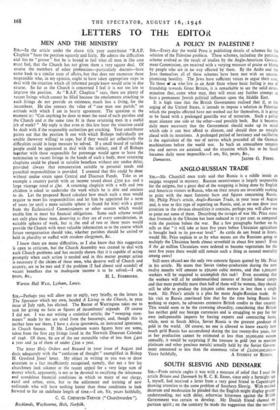LETTERS TO THE EDITOR MEN AND THE MINISTRY Sia,—In the
article under the above title your contributor "R.A.F. Chaplain "faces the position squarely and fairly. He admits the difficulties and has no " grouse " but he is botuld to feel what all men in like case must feel, that the Church has not given them a very square deal. Of course the members of other professions—particularly doctors—have come back to a similar state of affairs, but that does not exonerate those responsible who, in my opinion, ought to have taken appropriate steps to deal with the situation which all informed people knew would arise in due course. So far as the Church is concerned I feel it is not too late to improve the position. As " R.A.F. Chaplain" says, there are plenty of vacant livings which cannot be filled because the emoluments attaching to such livings do not provide an existence, much less a living, for the incumbent. He also stresses the value of "one man one parish," an attitude with which I am in hearty agreement. The question at the moment is: "Can anything be done to meet the need of such parishes and the Church and at the same time fit in these returning men in a useful job of work?" My reply is that even at this late hour the situation could be dealt with if the responsible authorities got cracking. Your contributor points out that the position it one with which Bishops individually are :unable (however willing) to cope, but if they would act collectively the difficulties could in large measure be solved. If a small board of suitable people could be appointed to deal with the subject, and if all Bishops together with those responsible for patronage would agree to leave the nomination to vacant livings in the hands of such a body, most returning chaplains could be placed in suitable benefices without any undue delay, provided always that remuneration suitable to personal needs and parochial responsibilities is provided. I contend that this could be done without undue strain upon Central and Diocesan Funds. Take as an example a country parish with an income round about £350 p.a. and a large vicarage rated at L60. A returning chaplain with a wife and two children is asked to undertake the work which he is able and anxious to do. Let the proposed Board calculate how much such a man would require to meet his responsibilities and let him be appointed for a term of years (or until a more suitable sphere is found for him) with a grant from the Ecclesiastical Commissioners or other sources which would enable him to meet his financial obligations. Some such scheme would not only place these men, deserving as they are of e‘ery consideration, in suitable spheres of work, but at, the end of two or three years would provide the Church with most valuable information as to the course which future reorganisation should take, whether parishes should be united or held in plurality or staffed with resident clergymen, &c.
I know there are many difficulties, as I also know that this suggestion is open to criticism, but the Church Assembly was created to deal with such Church problems and has recently shown that it is capable of acting promptly when such action is needed and in this matter prompt action is necessary if the claims of these nten, who deserve well of Church and country, are to be met and if tbe problem (I had almost said scandal) of vacant benefices due to inadequate income is to be solved.—I am,
yours, &c., H. L. FOSBROOKE.
Warton Hall West, Lytham, Lancs.


























 Previous page
Previous page